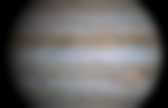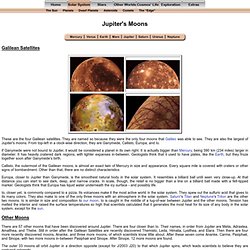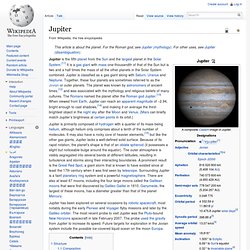

Jupiter. Jupiter means: Jupiter, known as Zeus in Greek mythology, over threw his father Saturn to become king of the gods.

He then split the universe with his brothers Neptune and Pluto. How much would you weigh on Jupiter? If you traveled to Jupiter on vacation, you would be very heavy. If you weigh 70 pounds (32 kg) on Earth, on Jupiter you would weigh 185 pounds (84 kg). This is because Jupiter is such a large planet and so has more gravity. The Planet Jupiter is by far the largest planet in our Solar System. Jupiter is a very stormy planet. Jupiter's great red spot, visible in the picture above to the right, is where a giant storm has been raging for at least 300 years. Jupiter is considered a gas giant because it does not have a solid surface. Rings Did you know Jupiter has rings? Moons: Jupiter has 50 official moons and 12 provisional (unofficial) moons. To learn about these worlds Click Here. Jupiter's Moons.
Jupiter's Moons These are the four Galilean satellites.

They are named so because they were the only four moons that Galileo was able to see. They are also the largest of Jupiter's moons. From top-left in a clock-wise direction, they are Ganymede, Callisto, Europa, and Io. If Ganymede were not bound to Jupiter, it would be considered a planet in its own right. Callisto, the outermost of the Galilean moons, is almost an exact twin of Mercury in size and appearance. Europa, closer to Jupiter than Ganymede, is the smoothest natural body in the solar system. Io, closer yet, is commonly compared to a pizza. There are 57 other moons that have been discovered around Jupiter. The outer 33 moons all orbit Jupiter in a direction opposite (except for J/2003 J20) to that which Jupiter spins, which leads scientists to believe they are captured asteroids.
The largest non-Galilean moon is Amalthea, being 262 km (163 miles) at its widest diameter. Jupiter. Structure Jupiter is composed primarily of gaseous and liquid matter.

It is the largest of four gas giants as well as the largest planet in the Solar System with a diameter of 142,984 km (88,846 mi) at its equator. The density of Jupiter, 1.326 g/cm3, is the second highest of the gas giants, but lower than for any of the four terrestrial planets. Composition Jupiter's upper atmosphere is composed of about 88–92% hydrogen and 8–12% helium by percent volume or fraction of gas molecules. Based on spectroscopy, Saturn is thought to be similar in composition to Jupiter, but the other gas giants Uranus and Neptune have relatively much less hydrogen and helium.[21] Because of the lack of atmospheric entry probes, high-quality abundance numbers of the heavier elements are lacking for the outer planets beyond Jupiter.
Mass Jupiter's diameter is one order of magnitude smaller (×0.10045) than the Sun, and one order of magnitude larger (×10.9733) than the Earth. Internal structure Atmosphere Cloud layers.